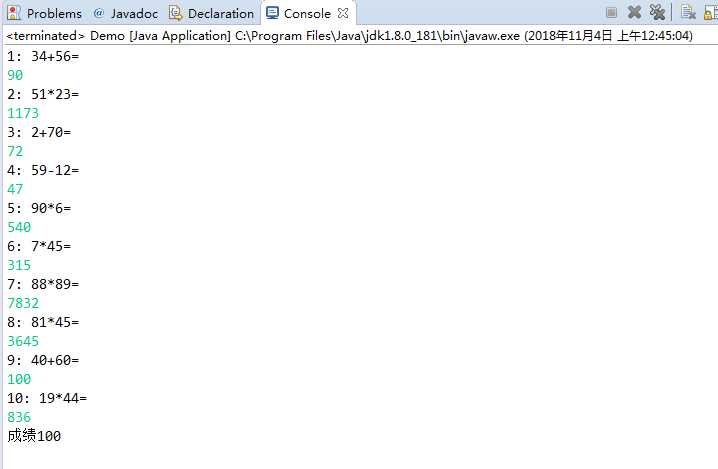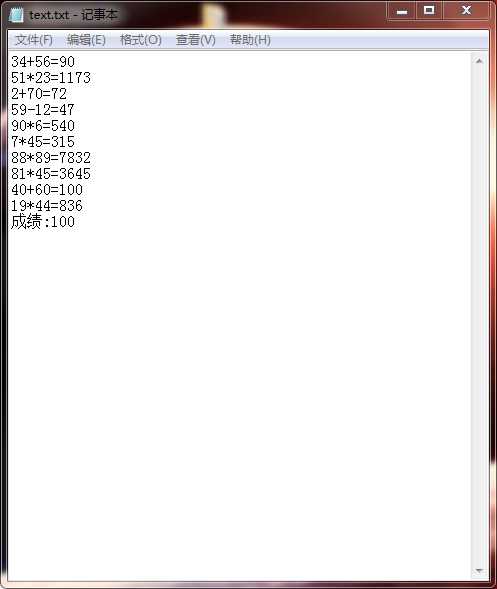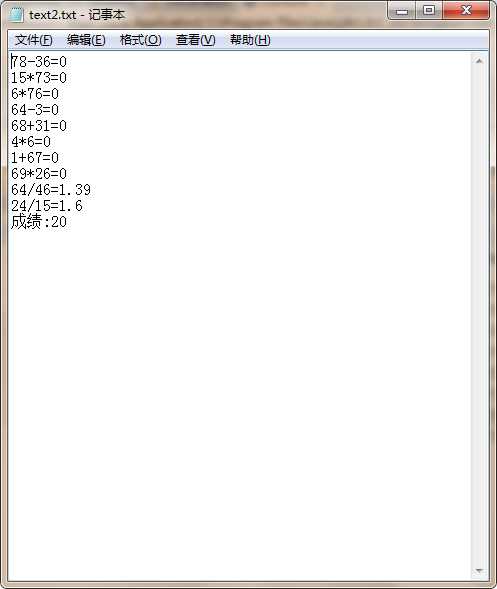tenth week
Posted 2017xinghui
tags:
篇首语:本文由小常识网(cha138.com)小编为大家整理,主要介绍了tenth week相关的知识,希望对你有一定的参考价值。
1。限制负数答案出现,限制商为0
import java.io.FileNotFoundException; import java.io.PrintWriter; import java.util.Scanner; import java.math.*; public class Demo { public static void main(String[] args) throws FileNotFoundException { Scanner in = new Scanner(System.in); PrintWriter out = new PrintWriter("D://text.txt");; int sum = 0; for (int i = 1; i <=10; i++) { int a = 1+(int)(Math.random() * 99); int b = 1+(int)(Math.random() * 99); int m= (int) Math.round(Math.random() * 3); switch(m) { case 0: while(a<b){ b = (int) Math.round(Math.random() * 100);a = (int) Math.round(Math.random() * 100); } System.out.println(i+": "+a+"/"+b+"="); int c0 = in.nextInt(); out.println(a+"/"+b+"="+c0); if (c0 ==Math.floorDiv(a, b)) sum += 10; break; case 1: System.out.println(i+": "+a+"*"+b+"="); int c = in.nextInt(); out.println(a+"*"+b+"="+c); if (c ==Math.multiplyExact(a, b)) sum += 10; break; case 2: System.out.println(i+": "+a+"+"+b+"="); int c1 = in.nextInt(); out.println(a+"+"+b+"="+c1); if (c1 == Math.addExact(a, b)) sum += 10; break ; case 3: while(a<=b){ b = (int) Math.round(Math.random() * 100);a = (int) Math.round(Math.random() * 100); } System.out.println(i+": "+a+"-"+b+"="); int c2 = in.nextInt(); out.println(a+"-"+b+"="+c2); if (c2 ==Math.subtractExact(a, b)) sum += 10; break ; } } System.out.println("成绩"+sum); out.println("成绩:"+sum); out.close(); } }


2。对除法实现实数的运算
import java.io.FileNotFoundException; import java.io.PrintWriter; import java.util.Scanner; import java.math.*; public class Main { public static void main(String[] args) throws FileNotFoundException { Scanner in = new Scanner(System.in); PrintWriter out = new PrintWriter("D://text2.txt");; int sum = 0; for (int i = 1; i <=10; i++) { int a = 1+(int)(Math.random() * 99); int b = 1+(int)(Math.random() * 99); double a1 =a; double b1 =b; int m= (int) Math.round(Math.random() * 3); switch(m) { case 0: while(a<b){ b = 1+(int)(Math.random() * 100);a = 1+(int)(Math.random() * 100); a1 =a; b1=b;} double c= Math.round((a1/b1)*100); System.out.println(i+": "+a+"/"+b+"=");System.out.println("答案保留两位小数"); //System.out.println(i+": "+a+"/"+b+"="+c/100); double c0 = in.nextDouble(); out.println(a+"/"+b+"="+c0); if (c0 ==c/100) sum += 10; break; case 1: System.out.println(i+": "+a+"*"+b+"="); int cc = in.nextInt(); out.println(a+"*"+b+"="+cc); if (cc ==Math.multiplyExact(a, b)) sum += 10; break; case 2: System.out.println(i+": "+a+"+"+b+"="); int c1 = in.nextInt(); out.println(a+"+"+b+"="+c1); if (c1 == Math.addExact(a, b)) sum += 10; break ; case 3: while(a<=b){ b = (int) Math.round(Math.random() * 100);a = (int) Math.round(Math.random() * 100); } System.out.println(i+": "+a+"-"+b+"="); int c2 = in.nextInt(); out.println(a+"-"+b+"="+c2); if (c2 ==Math.subtractExact(a, b)) sum += 10; break ; } } System.out.println("成绩"+sum); out.println("成绩:"+sum); out.close(); } }


test1

package pair1; /** * @version 1.01 2012-01-26 * @author Cay Horstmann */ public class PairTest1 { public static void main(String[] args) { String[] words = { "Mary", "had", "a", "little", "lamb" }; Pair<String> mm = ArrayAlg.minmax(words); System.out.println("min = " + mm.getFirst()); System.out.println("max = " + mm.getSecond()); } } class ArrayAlg { /** * Gets the minimum and maximum of an array of strings. * @param a an array of strings * @return a pair with the min and max value, or null if a is null or empty */ public static Pair<String> minmax(String[] a) { if (a == null || a.length == 0) return null; String min = a[0]; String max = a[0]; for (int i = 1; i < a.length; i++) { if (min.compareTo(a[i]) > 0) min = a[i]; if (max.compareTo(a[i]) < 0) max = a[i]; } return new Pair<>(min, max); } }

package pair1; /** * @version 1.00 2004-05-10 * @author Cay Horstmann */ public class Pair<T> { private T first; private T second; public Pair() { first = null; second = null; } public Pair(T first, T second) { this.first = first; this.second = second; } public T getFirst() { return first; } public T getSecond() { return second; } public void setFirst(T newValue) { first = newValue; } public void setSecond(T newValue) { second = newValue; } }

test2

package pair2; import java.time.*; /** * @version 1.02 2015-06-21 * @author Cay Horstmann */ public class PairTest2 { public static void main(String[] args) { LocalDate[] birthdays = { LocalDate.of(1906, 12, 9), // G. Hopper LocalDate.of(1815, 12, 10), // A. Lovelace LocalDate.of(1903, 12, 3), // J. von Neumann LocalDate.of(1910, 6, 22), // K. Zuse }; Pair<LocalDate> mm = ArrayAlg.minmax(birthdays); System.out.println("min = " + mm.getFirst()); System.out.println("max = " + mm.getSecond()); } } class ArrayAlg { /** Gets the minimum and maximum of an array of objects of type T. @param a an array of objects of type T @return a pair with the min and max value, or null if a is null or empty */ public static <T extends Comparable> Pair<T> minmax(T[] a) { if (a == null || a.length == 0) return null; T min = a[0]; T max = a[0]; for (int i = 1; i < a.length; i++) { if (min.compareTo(a[i]) > 0) min = a[i]; if (max.compareTo(a[i]) < 0) max = a[i]; } return new Pair<>(min, max); } }

package pair2; /** * @version 1.00 2004-05-10 * @author Cay Horstmann */ public class Pair<T> { private T first; private T second; public Pair() { first = null; second = null; } public Pair(T first, T second) { this.first = first; this.second = second; } public T getFirst() { return first; } public T getSecond() { return second; } public void setFirst(T newValue) { first = newValue; } public void setSecond(T newValue) { second = newValue; } }

test3

package pair3; /** * @version 1.01 2012-01-26 * @author Cay Horstmann */ public class PairTest3 { public static void main(String[] args) { Manager ceo = new Manager("Gus Greedy", 800000, 2003, 12, 15); Manager cfo = new Manager("Sid Sneaky", 600000, 2003, 12, 15); Pair<Manager> buddies = new Pair<>(ceo, cfo); printBuddies(buddies); ceo.setBonus(1000000); cfo.setBonus(500000); Manager[] managers = { ceo, cfo }; Pair<Employee> result = new Pair<>(); minmaxBonus(managers, result); System.out.println("first: " + result.getFirst().getName() + ", second: " + result.getSecond().getName()); maxminBonus(managers, result); System.out.println("first: " + result.getFirst().getName() + ", second: " + result.getSecond().getName()); } public static void printBuddies(Pair<? extends Employee> p) { Employee first = p.getFirst(); Employee second = p.getSecond(); System.out.println(first.getName() + " and " + second.getName() + " are buddies."); } public static void minmaxBonus(Manager[] a, Pair<? super Manager> result) { if (a.length == 0) return; Manager min = a[0]; Manager max = a[0]; for (int i = 1; i < a.length; i++) { if (min.getBonus() > a[i].getBonus()) min = a[i]; if (max.getBonus() < a[i].getBonus()) max = a[i]; } result.setFirst(min); result.setSecond(max); } public static void maxminBonus(Manager[] a, Pair<? super Manager> result) { minmaxBonus(a, result); PairAlg.swapHelper(result); // OK--swapHelper captures wildcard type } // Can‘t write public static <T super manager> ... } class PairAlg { public static boolean hasNulls(Pair<?> p) { return p.getFirst() == null || p.getSecond() == null; } public static void swap(Pair<?> p) { swapHelper(p); } public static <T> void swapHelper(Pair<T> p) { T t = p.getFirst(); p.setFirst(p.getSecond()); p.setSecond(t); } }

package pair3; import java.time.*; public class Employee { private String name; private double salary; private LocalDate hireDay; public Employee(String name, double salary, int year, int month, int day) { this.name = name; this.salary = salary; hireDay = LocalDate.of(year, month, day); } public String getName() { return name; } public double getSalary() { return salary; } public LocalDate getHireDay() { return hireDay; } public void raiseSalary(double byPercent) { double raise = salary * byPercent / 100; salary += raise; } }

package pair3; public class Manager extends Employee { private double bonus; /** @param name the employee‘s name @param salary the salary @param year the hire year @param month the hire month @param day the hire day */ public Manager(String name, double salary, int year, int month, int day) { super(name, salary, year, month, day); bonus = 0; } public double getSalary() { double baseSalary = super.getSalary(); return baseSalary + bonus; } public void setBonus(double b) { bonus = b; } public double getBonus() { return bonus; } }

package pair3; /** * @version 1.00 2004-05-10 * @author Cay Horstmann */ public class Pair<T> { private T first; private T second; public Pair() { first = null; second = null; } public Pair(T first, T second) { this.first = first; this.second = second; } public T getFirst() { return first; } public T getSecond() { return second; } public void setFirst(T newValue) { first = newValue; } public void setSecond(T newValue) { second = newValue; } }

---
程序要感谢学长的第一次读文件的模板,有了大体框架就只剩下核心算法,
修改程序后就能达到要求,通过学习课本知识和网上资料,对要实现的操作要求,
合理运用已经学习的知识和算法的例子就可以实现,虽然报错调试优化的时间占大多数,
但好歹时间充裕,努力努力就完成了。
----
第一个实验问题
读取每行内容时按空格" "为分界符读取到住址时不能合理读取,最后换成读取每行剩余内容完成要求。
查询最大最小年龄时读取年龄数据是String,无法比较大小,最后将数据强制换成int进行比较。
实现找同乡操作时,由于之前实现过相同的算法,完成起来较为轻松
实现查找同龄人操作时,先是只输出一个查找到的人,但看txt文本中有相同年龄的人
应该一起输出,最后完成的仍然有问题,但做的时间太长了很烦躁,之后没有优化
其他琐碎的问题不想说,大多是新知识不能合理运用和语法格式的问题
第二个实验
上周做关于整数的时候问题是如何随机生成四则运算,最后用决定switch语句实现
这一周实现实数的运算问题是用math类中方法保存两位小数
以上是关于tenth week的主要内容,如果未能解决你的问题,请参考以下文章
